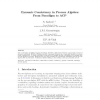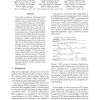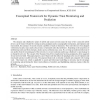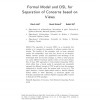131
click to vote
SCP
2011
14 years 9 months ago
2011
The coordination modelling language Paradigm addresses collaboration between components in terms of dynamic constraints. Within a Paradigm model, component dynamics are consistent...
120
click to vote
CORR
2011
Springer
14 years 9 months ago
2011
Springer
We examine the combination of two directions in the field of privacy concerning computations over distributed private inputs – secure function evaluation (SFE) and differential...
129
click to vote
PROPERTYTESTING
2010
14 years 12 months ago
2010
We give a high-level survey of the "testing by implicit learning" paradigm, and explain some of the property testing results for various Boolean function classes that ha...
142
click to vote
NAACL
2010
14 years 12 months ago
2010
State-of-the-art Machine Translation (MT) systems are still far from being perfect. An alternative is the so-called Interactive Machine Translation (IMT) framework. In this framew...
161
click to vote
WWW
2010
ACM
15 years 11 days ago
2010
ACM
Semantic Web applications take off is being slower than expected, at least with respect to “real-world” applications and users. One of the main reasons for this lack of adoptio...
124
click to vote
PROCEDIA
2010
15 years 13 days ago
2010
The dynamic and collaborative nature of mobile and sensor networks raises the issue of how connected mobile devices can be trusted. Despite the existing security paradigms such as...
137
click to vote
JOT
2010
15 years 14 days ago
2010
The separation of concerns (SOC), as a conceptual tool, enables us to manage the complexity of software systems that we develop. The benefits of this paradigm, such as reuse, enhan...
145
click to vote
SIGPLAN
2008
15 years 1 months ago
2008
By separating crosscutting concerns into modules, aspectoriented programming (AOP) can greatly improve the maintainability, understandability and reusability of software. However,...
117
click to vote
JKM
2007
15 years 1 months ago
2007
Purpose – This paper aims to examine the current thoughts on knowledge management (KM) and to develop a metaphor to combine these thoughts in a new way that effectively conveys ...
134
click to vote
AIR
2005
15 years 1 months ago
2005
The scientific research in the area of computational mechanisms for trust and reputation in virtual societies is a recent discipline oriented to increase the reliability and perfor...




